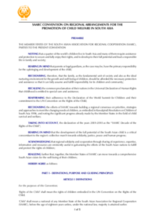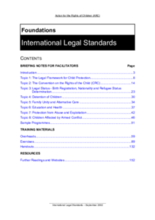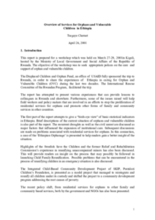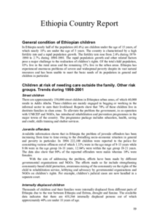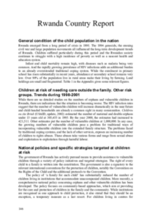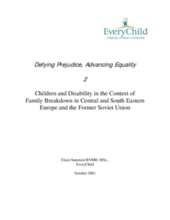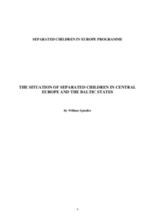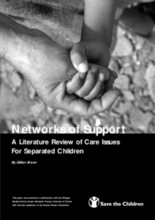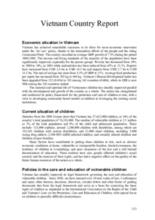Displaying 1741 - 1750 of 1798
Pursuant to the decision of the Ninth Summit, the SAARC Convention on Regional Arrangements on the Promotion of Child Welfare in South Asia was signed in January 2002 during the Eleventh Summit in Kathmandu.
Resource pack for a rigorous course on international legal standards for children. Includes notes for facilitators, participatory exercises, overheads, and handouts.
This article, a chapter in the book Family Foster Care in the Next Century, describes how child well-being has been conceptualized and measured in research on family foster care, and discusses the essential dimensions that should be included in a useful measure of child well-being.
A report on a workshop that was presented in Rwanda that sought to share the experiences of of Ethiopia in caring for orphan and vulnerable children. The aim was to provide lessons to colleagues in Rwanda and elsewhere. The report includes statistical data, information on reunification programs, and reviews recent government and NGO policy shifts.
Country report of Ethiopia on the situation of children in residential care in anticipation of the Second International Conference on Children and Residential Care: New Strategies for a New Millennium, to be held in Stockholm 12 – 15 May 2003.
Country report of Rwanda on the situation of children in residential care in anticipation of the Second International Conference on Children and Residential Care: New Strategies for a New Millennium, to be held in Stockholm 12 – 15 May 2003.
A study on children with disabilities in the context of family breakdown. Includes overviews and statistics from 10 countries, a call for strengthened family support services, and draft guidelines on how child agencies can better mainstream these issues into their work.
This report reviews childcare policy for separated children in the Central Europe and the Balkan States. It emphasizes the need to establish training, resources and effective procedures in order to meet the standards outlined in the Statement of Good Practice. Data from Bulgaria, Croatia, the Czech Republic, Estonia, Hungary, Latvia, Lithuania, Poland, Romania, Slovakia and Slovenia is presented.
This report reviews existing the literature on separated children and examines childhood, family, childcare practices and separation. It highlights the importance of context and child participation in designing programs and policies to assist separated children.
Country report of Vietnam on the situation of children in residential care in anticipation of the Second International Conference on Children and Residential Care: New Strategies for a New Millennium, to be held in Stockholm 12 – 15 May 2003.

